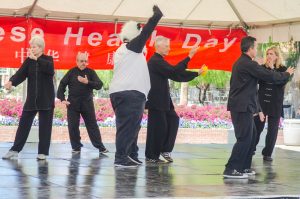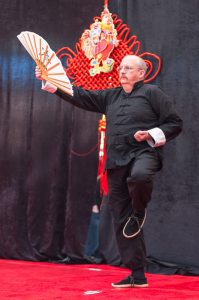Health Benefits

Taiji* Quan, Zhan Zhuang standing meditation and Qi Gong are time-tested holistic disciplines for cultivating and increasing the flow of Qi through the body’s meridians, at the same time, Taiji quan also has serious applicability for self-defense.
In China, the practice of combining the principles of movement with breath and mindfulness has been used to maintain health, cure chronic conditions and develop the practitioner’s overall physical and mental well-being even into advanced old age. The two primary practices used are Tai Chi Chuan and Qi Gong, both of which extend back in time 100s and even 1000s of years, with Qi Gong being the oldest of the practices.
In recent years, a substantial body of evidence-based research has been published regarding the benefits of meditative movement. One study reviewed over 70 published articles on studies that demonstrated positive outcomes in nine (9) categories:
- Increases Bone density
- Improves Cardiopulmonary effects
- Improves Physical functions
- Reduces Falls and related risk factors
- Increases Quality of life
- Increases Self-efficacy
- Improved Patient reported outcomes
- Improvements of Psychological symptoms
- Enhanced Immune functions

According to a University of Florida study, Tai Chi Chuan practice appears to be beneficial in lowering blood glucose levels in Type II diabetics, allowing people with diabetes to better control their disease. In adults with type 2 diabetes, the study found that participants in a supervised tai chi exercise program two days per week with three days of home practice lowered their fasting blood glucose levels, better managed their disease, and improved their overall quality of life compared to those who participated at a lower level of intervention. The study demonstrated that tai chi chuan provided benefits similar to other more strenuous aerobic exercises, like walking or jogging.
Tai chi chuan and Qi Gong are low impact meditative exercises, which makes them appropriate for individuals of any age or fitness level. Truly practicing Tai Chi Chuan and Qi Gong is much like taking a mini vacation from stress and our typically hectic lifestyles each day. Chinese Internal martial and health practice can be a cornerstone for a healthy and more enjoyable way of living.
Unlike some other types of exercise, Tai Chi is accessible to people of any age and condition–children, senior citizens, and even those with walkers. Some modified forms of Tai Chi can be practiced by those with limited mobility. In fact, Tai Chi is particularly beneficial to the elderly and those with impaired motor skills. Since Tai Chi emphasizes correct posture and balance, the exercise may be a safer exercise alternative for people with frail bones. Moreover, you need no special clothes or equipment and you can practice at home.
- Medical science remains unclear about how Tai Chi works. While several studies have documented the benefits of Tai Chi, none has completely explained why or how–at least in the context of Western medicine. But there are theories. While traditional practitioners might attribute the health benefits to the free flow of chi, Western-world scientific research into Tai Chi is finding other possible explanations for its salutary effects.
- For instance: deep breathing promotes relaxation, stress reduction and concentration.
- focused attention not only relaxes the body and mind, it helps cultivate mental alertness.
- the exercises strengthen muscles and bones (for instance, as a weight-bearing exercise that requires you to support your weight while standing, Tai Chi is a good preventive measure for osteoporosis),
- and since most of the movements involve alternating weight-bearing in the legs, Tai Chi helps you cultivate better balance by improving coordination and control of the body during movements.
You can find more resources on Tai Chi Chuan and health in our resources and links page.
